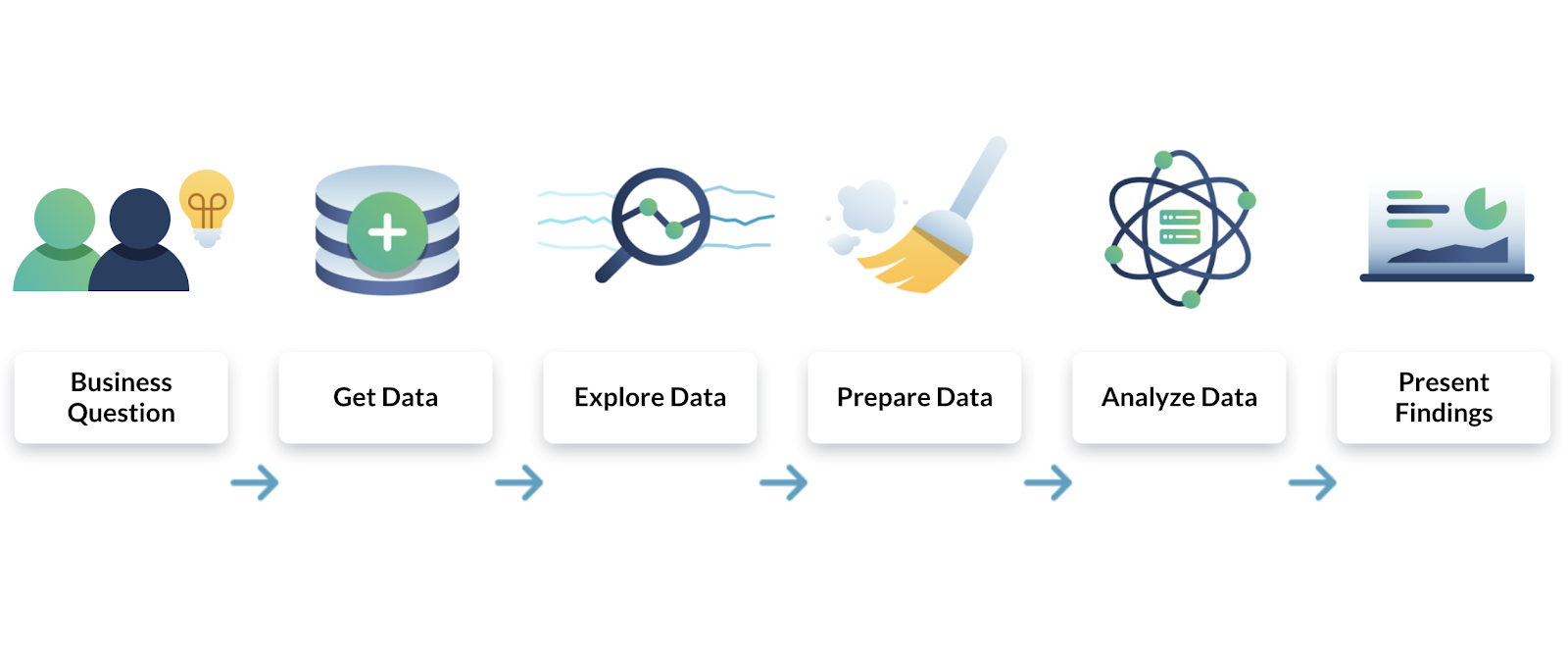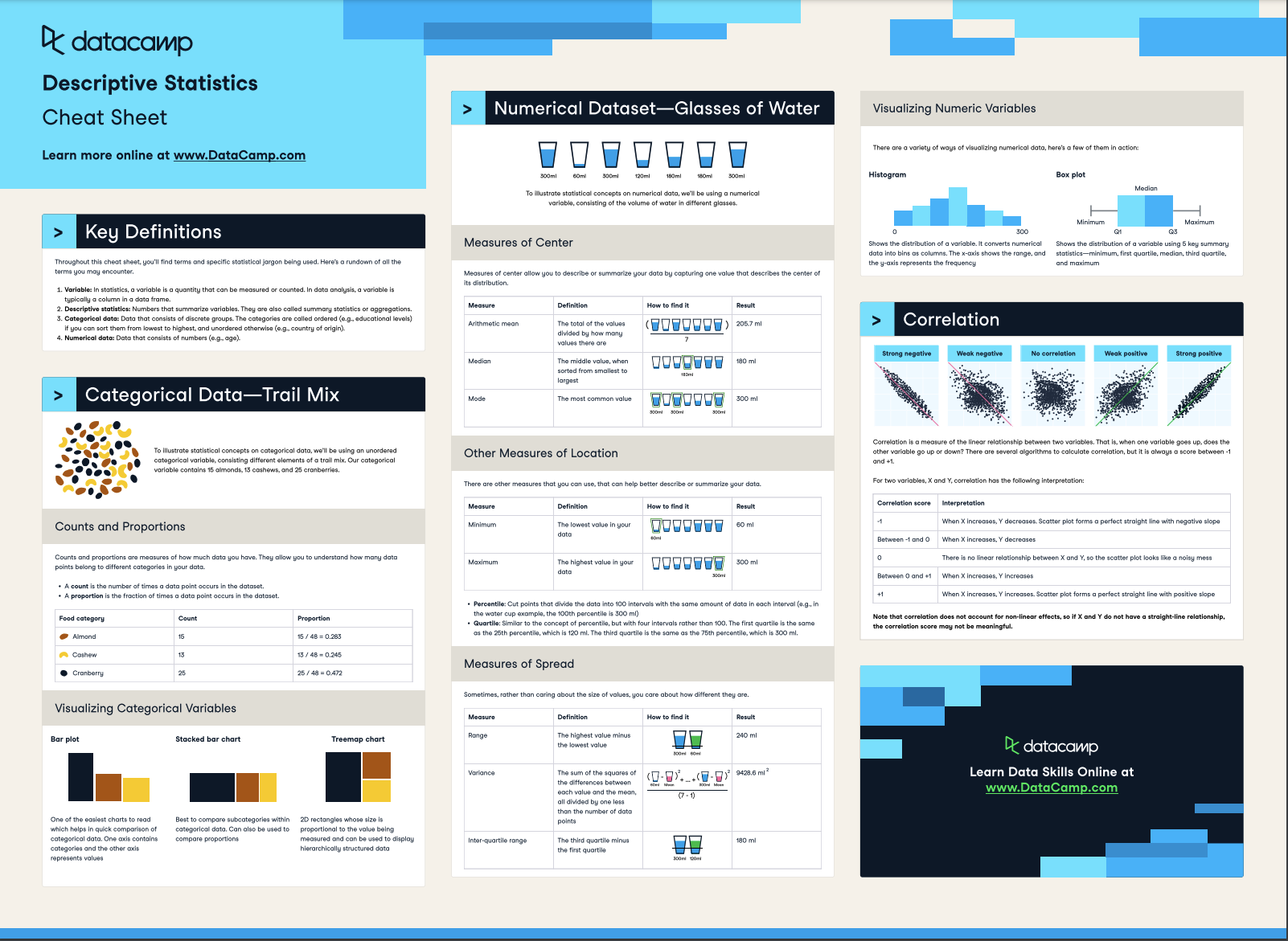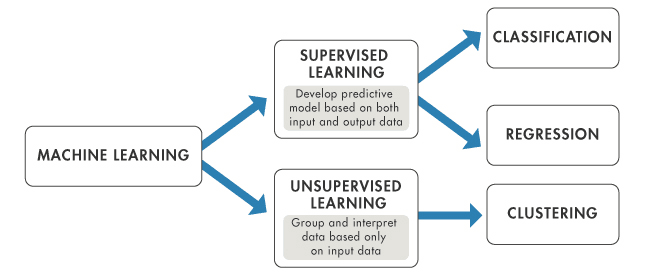Course
Data analysts and data scientists are in high demand. According to the U.S. Bureau of Labor Statistics, employment in data science and analytics is projected to grow by 31% from 2019 to 2029, much faster than the average for all occupations. This statistic is hardly surprising. Data has become more essential than ever, and those who can work with data to extract meaningful insights are highly valued.
But what data analyst skills make this role such a vital one? This comprehensive guide will introduce you to the knowledge and competencies you’ll need in your career as a data analyst. We have a separate guide on becoming a data analyst, which goes into full detail about starting your career. However, in this post, we’ve also included some brief tips on how to learn key data analyst skills.
The Foundation: Understanding What Data Analysts Do
We’ve got a full article exploring what data analysts do, which looks at some of the roles and responsibilities expected in this role. Here, we’ll take a brief look at some of the key things you need to know.
Role and responsibilities of a data analyst
Data analysts serve as the linchpin between raw data and actionable insights. They gather, process, and analyze data to help organizations make informed decisions.
Data analysts often collaborate with different departments, from marketing to finance, to understand business objectives and translate them into data-driven solutions.
The data analysis process
The data analysis process is a multi-step journey that starts with data collection and ends with actionable insights. We cover the topic in greater detail in our guide, What is Data Analysis? You can see from the infographic below that there are several stages to the process.

The data analysis process in a nutshell
Each step— from determining the outcome to data collection, cleaning, analysis, visualization, and interpretation—is crucial for deriving accurate and meaningful outcomes. Our Data Analyst with Python career track covers everything you need to know about the process and will teach you how to analyze data from scratch.
Essential Data Analyst Skills: Technical Skills
Technical skills form the backbone of a data analyst's expertise. These skills enable you to manipulate data, conduct complex analyses, and generate insights to drive business decisions. Let’s take a look at the technical data analyst skills you’ll need:
1. Programming languages (Python, R, SQL)
In the realm of data analytics, programming languages like Python, R, and SQL are indispensable. These languages allow you to manipulate data, perform statistical analyses, and create data visualizations.
- Python. Widely used for data manipulation and analysis, Python boasts a rich ecosystem of libraries like Pandas and NumPy.
- R. Specialized for statistical analysis, R is another powerful tool often used in academic research and data visualization.
- SQL. The go-to language for database management, SQL allows you to query, update, and manipulate structured data.
2. Data Visualization Tools (Tableau, Power BI)
Data visualization is not just about creating charts; it's about telling a story with data. Tools like Tableau and Power BI are widely used for this purpose, allowing you to transform complex data into easily digestible visual formats.
- Tableau. Known for its user-friendly interface, Tableau allows you to create complex visualizations without any coding. It's particularly useful for creating interactive dashboards that can be easily shared across an organization.
- Power BI. Developed by Microsoft, Power BI is another powerful tool for creating interactive reports and dashboards. It integrates seamlessly with various Microsoft products and allows for real-time data tracking, making it popular in corporate settings.
Become a Tableau Data Analyst
Become a Power BI Data Analyst
Master the world's most popular business intelligence tool.
3. Statistical Analysis
Statistical analysis is the backbone of data analytics, providing the methodologies for making inferences from data. Understanding statistical methods allows you to use the following:
- Descriptive statistics. Summarize and interpret data to provide a clear overview of what the data shows.
- Inferential statistics. Make predictions and inferences about a population based on a sample.
- Hypothesis testing. Evaluate theories or hypotheses with a view to solving practical problems.

Our descriptive analysis cheat sheet can act as a quick reference guide
4. Data Wrangling and Cleaning
Before any data analysis can occur, the data must be cleaned and transformed into a usable format, a process known as data wrangling. This involves:
- Data cleaning. Identifying and correcting errors, inconsistencies, and inaccuracies in datasets.
- Data transformation. Converting data into a format that can be easily analyzed, which may involve aggregating, reshaping, or enriching the data.
- Data integration. Combining data from different sources and providing a unified view.
Essential Data Analyst Skills: Soft Skills
While technical skills may get your foot in the door, soft skills ensure that you can effectively communicate your findings and collaborate with others. These skills are often what set great data analysts apart from good ones.
5. Communication skills
In the context of data analytics, communication is not just about presenting findings; it's about translating complex data into actionable insights that can be easily understood by non-technical stakeholders. Effective communication involves:
- Data storytelling. The ability to weave data into a compelling narrative that drives business decisions.
- Presentation skills. Mastery of presentation tools and the ability to present data visually and verbally are key.
- Interpersonal skills. Building relationships with team members and stakeholders is crucial for collaborative projects.
6. Problem-solving abilities
Data analysts are often faced with ambiguous problems that require analytical thinking. Problem-solving in data analytics involves:
- Critical thinking. The ability to objectively analyze and evaluate issues to form a judgment.
- Analytical reasoning. Using logical reasoning to approach problems and make decisions based on data.
- Innovation. Sometimes, traditional methods won't cut it, and you'll need to think outside the box.
7. Attention to detail
According to a Gartner report, poor data quality can cost organizations an average of $12.9 million every year, highlighting the importance of attention to detail.
In data analytics, even a small error can lead to incorrect conclusions. Attention to detail is critical for:
- Data cleaning. Ensuring the data you work with is accurate and free from errors.
- Quality assurance. Double-checking your analyses and visualizations for accuracy.
- Documentation. Keeping thorough records of your data sources, methodologies, and code.
Advanced Data Analyst Skills: Taking Your Career to the Next Level
As you gain experience and mastery over foundational skills, you'll find that the world of data analytics offers even more specialized areas to explore. These advanced skills can set you apart in a competitive job market and offer new avenues for career growth.
8. Machine learning
Machine learning is an extension of data analytics that allows computers to learn from data. According to a Gartner report, in 2022, 20% of analytic applications were augmented with machine learning, a number that’s likely to increase thanks to machine learning and AI’s growing importance.
Understanding the basics can significantly broaden your capabilities as a data analyst. This includes:
- Supervised learning. Techniques for building models that can make predictions based on labeled data.
- Unsupervised learning. Methods for finding patterns in unlabeled data.
- Natural Language Processing (NLP). A subfield focusing on the interaction between computers and human language.

Comparing supervised and unsupervised learning - key data analyst skills
9. Big data technologies
Data from Statista shows that the big data market was expected to grow from $42 billion in 2018 to $103 billion by 2027, emphasizing the increasing need for skills in big data technologies.
As data continues to grow in volume and complexity, big data technologies like Hadoop and Spark are becoming increasingly important. These technologies allow you to work on:
- Data storage. Handle large datasets that are beyond the capacity of traditional databases.
- Data processing. Perform complex computations and analyses on big data.
- Real-time analytics. Analyze data in real time to make immediate business decisions.
Building a Skillset: How to Acquire Data Analyst Skills
Acquiring a robust skillset in data analytics involves more than just taking a few online courses. It's a continuous journey that may include formal education, self-study, and practical experience.
There are multiple pathways to becoming a skilled data analyst, each with its own set of advantages and disadvantages:
- Online resources. With options including DataCamp’s Data Analyst in SQL career track, there are plenty of online, self-paced methods for acquiring the data analyst skills you’ll need to start your career.
- Bachelor's degree. A degree in computer science, statistics, or a related field provides a strong foundation but requires a long-term commitment.
- Master's programs. Specialized programs in Data Science or Business Analytics offer in-depth knowledge and often include hands-on projects.
- Bootcamps. These intensive programs focus on practical skills and are generally shorter and more job-oriented.
Final Thoughts
The role of a data analyst is multifaceted, requiring a blend of technical skills, soft skills, and specialized knowledge. As the field of data analytics continues to evolve, staying updated with the latest skills is not just an option—it's a necessity. Whether you're just starting your journey or looking to advance your career, mastering these skills can set you on the path to becoming an exceptional data analyst.
Ready to take the next step in your data analytics journey? DataCamp offers a comprehensive Data Analyst with Python track that covers everything from Python programming to data visualization and machine learning. In addition, our Data Analyst Certification enables you to prove your expertise to recruiters and apply for job with confidence. Enroll today to gain hands-on experience and take your skills to the next level.
Get certified in your dream Data Analyst role
Our certification programs help you stand out and prove your skills are job-ready to potential employers.

FAQs
What’s the difference between a data analyst and a data scientist?
While both roles involve working with data, the key difference is in their focus and scope. Data analysts focus primarily on interpreting existing data to provide actionable insights, often using tools like SQL, Excel, and data visualization platforms. Data scientists, on the other hand, often build predictive models and use machine learning algorithms to forecast trends and automate decision-making processes. Data scientists typically require a deeper understanding of programming and statistical modeling.
How important are data storytelling skills for a data analyst?
Data storytelling is critical because it allows data analysts to translate complex data findings into insights that non-technical stakeholders can understand and act upon. Effective data storytelling involves not just presenting numbers but creating a narrative around those numbers that resonates with the audience. Without this skill, even the most insightful analyses may go unappreciated or unused.
What role does automation play in a data analyst's job?
Automation is becoming increasingly important for data analysts as it helps reduce repetitive tasks like data cleaning, transformation, and reporting. Tools like Python scripts, SQL queries, and platforms like Power BI or Tableau allow analysts to automate data workflows and focus more on generating insights. Learning automation not only boosts productivity but also enhances the ability to handle larger datasets efficiently.
Do I need to know machine learning as a data analyst?
While machine learning isn't always required for a traditional data analyst role, understanding the basics can give you a competitive edge. Knowing how machine learning works allows you to collaborate more effectively with data scientists and engineers. Additionally, many advanced analytics tasks like predictive modeling or anomaly detection overlap with machine learning concepts, making it a useful skill to have.
How important is domain knowledge for a data analyst?
Domain knowledge is highly important for data analysts as it helps in contextualizing data and generating relevant insights. For instance, a data analyst working in healthcare will need to understand medical terminologies and regulatory constraints to provide meaningful analyses. Similarly, in finance, understanding financial metrics and compliance rules can make a significant difference in the quality of insights delivered.

A senior editor in the AI and edtech space. Committed to exploring data and AI trends.


